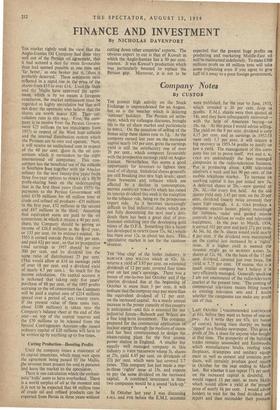FINANCE AND INVESTMENT .
By NICHOLAS DAVENPORT THE market rightly took the view that the Anglo-Iranian Oil Company had done very well out of the Persian oil agreement, that it had secured a deal far more favourable than had seemed possible at one time and 'far better,' as one broker put it, 'than it probably deserved.' These sentiments were reflected in a rapid rise in the price of the shares from £13 to over £16. Until the Shah and the Majlis have approved the agree- ment, which is by no means a foregone conclusion, the market enthbsiasm must be regarded as highly speculative but that will not deter the optimists who believe that the shares are worth nearer £20. Their cal- culation runs in this way. First, the com- pany is to receive from the Persian Govern- ment £25 millions (in ten instalments from 1957) in respect of the West Iran oilfields and the internal distribution system which the Persians are to own and operatd. Next, it will receive an undisclosed sum in respect of the 60 per cent. glare in the oil con- sortium which it surrenders to the eight international oil companies. This con- sortium has the beneficial use of the oilfields in Southern Iran together with the Abadan refinery for the next twenty-five years (with three five-year options to renew) on a 50/50 profit-sharing basis on the understanding that in the first three years (from 1955) the payments to the Persian Government will total £150 millions for 68 million tons of crude and refined oil products-£31 millions in the first year, £52 millions in the second and £67 millions in the third. Assuming that equivalent sums are paid to the oil consortium, in which it retains a 40 per cent. share, the Company should be getting an income of £26.8 millions in the third year, or 133 per cent. on its ordinary capital. In 1953 it earned outside Persia 1684 per cent. and paid 424 per cent., so that its prospective total earnings in 1957 should be over 300 per cent. and its dividend (on the same ratio of distribution) 75 per cent. (This would allow at £16 an earnings yield of over 18 per cent. and a dividend yield of nearly 4.7 per cent.). So much for the income calculation. On capital account it is reckoned that taking only five years' puichase of 60 per cent. of the 1957 profits accruing to the oil consortium the Company will be paid a capital sum of £214 millions spread over a period of, say, twenty years. If the present value of these sums (say, about £180 millions) is taken into the Company's balance sheet at the end of this year-on top of the capital reserves and the £50 millions to be released from the Special Contingencies Account-the issued ordinary capital of £20 millions will have to be written up by anything up to five times.
Cutting Production-Boosting Profits Until the company issues a statement of its capital intentions, which must wait upon thc agreement being passed by the Majlis, tthe investor must possess his soul in patience and leave the market to the speculator.
There is one calculation which the enthusi- astic bulls' seem to have overlooked. There is a world surplus of oil at the moment and it is not to be expected that 68 million tons of crude oil and refined products can be exported from Persia in three years without
cutting down other countries' exports. The obvious export to cut is that of Kuwait in which the Anglo-Iranian has a 50 per cent. interest. It was Kuwait's production which was particularly boosted to replace the Persian gap. Moreover, it is not to be
expected that the present huge profits on producing and marketing Middle-East oil will be maintained indefinitely. To make £300 millions profit on 68 million tons will take some explaining even if you agree to give half of it away to a poor foreign government.


































 Previous page
Previous page